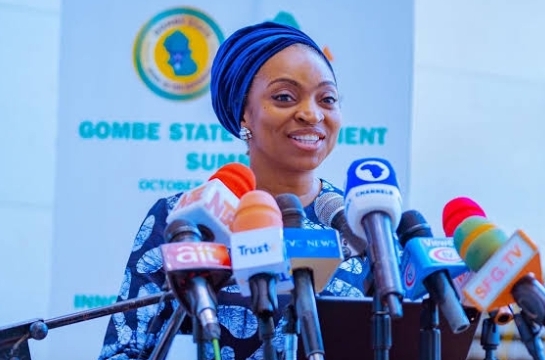Friday May 16, 2025 |
The Federal Government says it will begin grading ministries, departments, and agencies based on how well they support local businesses through their procurement decisions.
Minister of Industry, Trade and Investment, Jumoke Oduwole, announced this on Thursday, May 16, during an interview on Channels Television.
She said the Nigeria First policy, which gives priority to Nigerian-made goods and services, will now serve as a performance yardstick for MDAs under the supervision of the Central Coordinating Delivery Unit of the Presidency.
“The ‘Nigeria First’ policy is not entirely new, but a remix. It is Mr. President prioritising and reminding the country to put Nigeria first,” she said.
The policy, approved by the Federal Executive Council on May 5, mandates that government agencies must patronise Nigerian manufacturers, service providers, and contractors before considering foreign alternatives.
If foreign goods or services are needed, agencies must provide proper justification and secure a waiver from the Bureau of Public Procurement.
Oduwole explained that while previous policies, including an executive order on local content now part of the Business Facilitation Act, have been in place for years, compliance has remained weak.
“So you recall there was an executive bill on local content, and sometimes, Nigerians and Ministries, Departments and Agencies tend to forget that we should buy Nigerian first.
“Everybody knows what trade rules are and preferences. You are not meant to discriminate, but mentally understand that you need to patronise what Nigerian industry and businesses are producing,” she said.
“We need to produce what we consume and consume what we produce. So with the way global trade has positioned itself, Mr. President is reminding all of us, including the Ministry of Industry, Trade, and Investment, that champions made-in-Nigeria goods and industrialisation.”
According to her, the policy is not just about patriotic buying but a long-term strategy to boost local production, attract both foreign and domestic investment, and encourage exports.
“As you correctly said, we want investment, whether it’s domestic or foreign investment, which leads to productivity and to investing in economic activity. That leads to trading, and preferably export, to generate more income and investment. So that’s the cycle,” she said.
She added that each ministry’s compliance with the Nigeria First policy would be reviewed quarterly, and those falling short would be held accountable.
“We are measuring the compliance level of ministries with this policy. The implementation of the Nigeria First Policy now forms part of our performance matrix under the Central Coordinating Delivery Unit deliverables for Mr. President. That process is ongoing, and it will be tracked,” she said.
Highlighting the role of government in driving demand, Oduwole pointed out that public procurement accounts for a significant chunk of economic activity, making it critical for the government to lead by example.
“So the government is like a really big spender in Nigeria. So, Mr. President has said that the procurement process must be streamlined and simpler for Nigerian businesses to be able to have patronage from the government. That’s the first thing.
“The second thing is to be conscious when we’re making our procurement and buying things to make sure that we have exhausted all possible local options, maybe Nigerian options, before buying other options.
That’s the second thing.
“And the third thing is now the regulatory and bureaucratic landscape, just to make sure our businesses thrive,” she said.
She stressed that simplifying the process for local businesses to access government contracts is just as important as insisting on local content.
“The procurement process must be streamlined and simpler for Nigerian businesses to access government patronage.
“The Central Coordinating Delivery Unit will actually measure us quarter on quarter. We need to produce what we consume and consume what we produce,” she added.
Related posts
Categories
- Advertisements (1)
- Agriculture (45)
- Breaking News (26)
- Business (598)
- Crime (992)
- Education (321)
- Entertainment (128)
- Features (13)
- For The Records (43)
- Foreign News (1,190)
- Health (219)
- Home News (332)
- Interview (9)
- Judiciary (352)
- Lifestyle (140)
- Local News (111)
- National News (1,449)
- Opinion (26)
- Politics (1,014)
- Religion (158)
- Science and Technology (125)
- Security (684)
- Sports (881)
- States' News (822)
- Transportation (330)
- Uncategorized (10)

